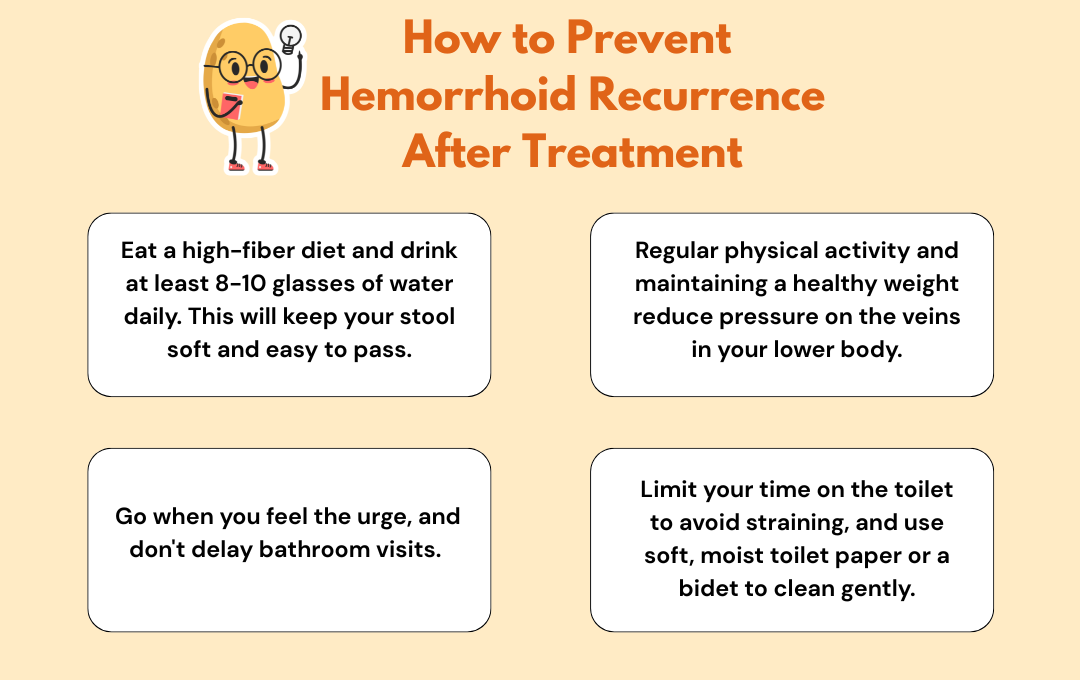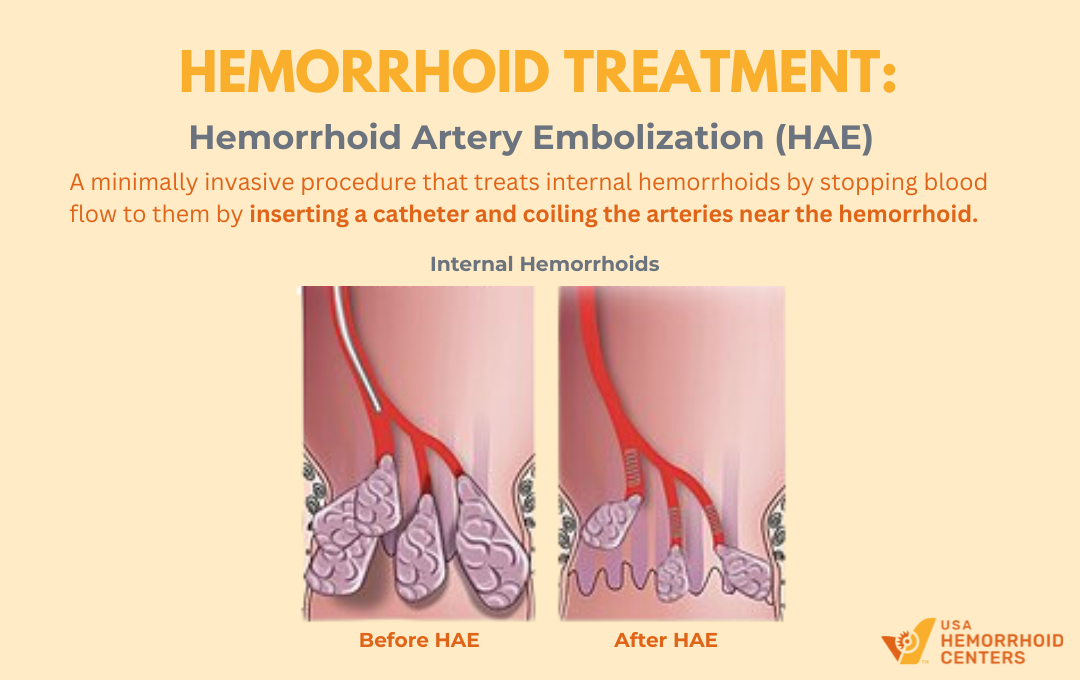
Anyone who has ever experienced the discomfort of hemorrhoids knows that they are more than just a minor inconvenience and can be a painful and frustrating part of everyday life. Even after finally finding relief through treatment, one question inevitably comes to mind: can hemorrhoids come back?
The answer, however, may not be so simple. While treatments can be highly effective, hemorrhoids are known for their tendency to return. The probability of a recurrence depends on the type of hemorrhoid treatment chosen, and the lifestyle changes made posttreatment.
Discovering why hemorrhoids return and the treatments that can offer lasting relief can help in taking simple steps to prevent them from coming back.
A Quick Review of Hemorrhoids and Treatments
While you may have already dealt with hemorrhoids, it is important to remember that some symptoms like bleeding, pain, or a persistent lump can indicate their comeback. In some cases, certain hemorrhoid symptoms can also mimic other serious conditions such as colorectal or prostate cancer. If you experience these symptoms again, it is always best to consult a doctor to get a proper diagnosis.
Hemorrhoids, which are swollen veins in your lower rectum and anus, can be either internal or external. Even after a previous treatment, they can return. The severity of a recurrence can varies from a mild and temporary annoyance to a painful, chronic condition.
If your hemorrhoids come back, the initial steps you took before, such as lifestyle changes and home remedies, may be effective for mild cases. However, if the symptoms are more persistent or severe than before, or if they just do not go away, you may need to discuss other options with your doctor. These could include a different medical procedure or surgery.
Common causes and contributing factors to look out for include:
- Chronic constipation or diarrhea
- Straining during bowel movements
- A low-fiber diet
- Pregnancy and childbirth
- Obesity
- Prolonged sitting, especially on the toilet
Types of Hemorrhoid Treatments
Treatments for hemorrhoids range from home remedies to surgical interventions, depending on the severity and type.
Home Remedies and Lifestyle Adjustments
For mild cases, many people find relief from hemorrhoids through lifestyle changes.
- Diet: A high-fiber diet rich with fruits, vegetables, and whole grains helps soften stool and prevent straining.
- Topical treatments: Over-the-counter creams, ointments, and pads containing ingredients like hydrocortisone or witch hazel can soothe irritation and pain.
- Sitz baths: Soaking the anal area in warm water for 10-15 minutes, several times a day, can help reduce swelling and pain.
Minimally Invasive Procedures
These office-based procedures are often used for persistent or bleeding internal hemorrhoids.
- Rubber band ligation: A small rubber band is placed around the base of the hemorrhoid, cutting off its blood supply. The hemorrhoid eventually shrinks and falls off.
- Infrared coagulation: A device uses infrared light to create scar tissue, which restricts blood flow to the hemorrhoid, causing it to shrink.
- Sclerotherapy: A chemical solution is injected into the hemorrhoid to shrink it by causing scar tissue to form.
- Hemorrhoidal Artery Embolization (HAE): This is a promising, minimally invasive procedure for treating internal hemorrhoids by shrinking them through the arteries.
Surgical Options
For large, painful, or persistent hemorrhoids that have not responded to other treatments, surgery may be an important consideration.
- Hemorrhoidectomy: This is the surgical removal of hemorrhoids. It is often the most effective solution for severe cases, but it carries more risk, and a longer recovery time.
- Hemorrhoidopexy: Hemorrhoid surgery in which a circular stapler is used to reposition the hemorrhoid in the anal canal and remove excess tissue.
Though traditional surgical methods can eliminate hemorrhoids, they do come with potential complications including infection, blood loss, and difficulty with urination. If you are weighing your treatment choices, a hemorrhoid expert can help you navigate to the most suitable solution for your symptoms.
Can Hemorrhoids Return After Treatment?
While a hemorrhoidectomy is considered a permanent cure for the hemorrhoids that are removed, new ones can still develop in the future. The potential for recurrence depends on the treatment type:
- Home remedies and dietary changes: These can manage symptoms and prevent future flare-ups, but they do not remove the hemorrhoids themselves. There is a higher probability of recurrence if underlying causes, like straining and constipation are not addressed.
- Minimally invasive procedures: Procedures like banding, sclerotherapy and hemorrhoid artery embolization are highly effective, but they do not guarantee that a new hemorrhoid will not Recurrence rates for banding and sclerotherapy can range from 15% to 50% over five years, influenced by a patient’s habits. For HAE, studies have shown durable results with a low recurrence rate.
- Surgical options: A hemorrhoidectomy offers the lowest risk of recurrence. While it’s not a total guarantee against future hemorrhoids, it is highly effective, depending on patients’ self-care.
Factors that influence recurrence include:
- Diet and lifestyle: A sedentary lifestyle and a low-fiber diet are major contributors
- Bowel habits: Chronic constipation or straining are the causes of hemorrhoids
- Genetics: A family history can lead to weaker vein walls and less elastic connective tissue in the rectal and anal area.

When to Seek Medical Advice
If you are having hemorrhoid symptoms, or if you notice they are worsening or recurring after treatment, it is best to seek medical advice.
Consult a hemorrhoid specialist if you experience persistent bleeding, severe or increasing pain, hemorrhoids that do not respond to home treatments and a new lump or swelling. They can provide an accurate diagnosis, recommend the most effective treatment for your specific situation, and rule out other more serious conditions
MEET OUR HEMORRHOID SPECIALISTS
Hemorrhoid Artery Embolization (HAE)

Hemorrhoidal artery embolization (HAE) is a promising, minimally invasive treatment for internal hemorrhoids. During the procedure, a doctor uses a catheter to locate and block the small arteries that supply blood to the hemorrhoids. This reduces blood flow, causing the hemorrhoids to shrink over time.
While traditional treatments like rubber band ligation and invasive surgery are available, hemorrhoid treatment has advanced tremendously. USA Hemorrhoid Centers offer an advanced minimally invasive procedure called hemorrhoid artery embolization (HAE). This treatment addresses internal hemorrhoids by cutting off their blood supply.
During the procedure, an interventional radiologist uses X-ray imaging to guide a catheter and tiny particles into the arteries that feed the hemorrhoid. These particles reduce blood flow, causing the hemorrhoid to shrink and stop bleeding. HAE is a painless procedure and according to studies has a high success rate. [i]
Benefits of HAE:
- Minimally invasive: Unlike surgery, HAE doesn’t involve incisions.
- Less pain and faster recovery: Patients typically experience minimal discomfort and can return to their daily activities much sooner than after a hemorrhoidectomy.
- High success rate: Studies have shown HAE to be effective in reducing or eliminating symptoms.
Find Hemorrhoid Relief the Non-Surgical Way
USA Hemorrhoid Centers’ network of highly skilled interventional radiologists specializes in a modern, minimally invasive procedure called hemorrhoid artery embolization (HAE) to treat internal hemorrhoids. Along with internal hemorrhoids, USA Hemorrhoid Centers also treat problems related to hemorrhoids, including hemorrhoid prolapse, thrombosed hemorrhoids, and uncomfortable symptoms like bleeding and itching.
Our commitment to high-quality, patient-focused care is reflected in our accreditation by the Accreditation Association for Ambulatory Health Care (AAAHC). We strive to make treatment accessible by accepting most major insurance plans and offering flexible payment options. If you are experiencing symptoms of internal hemorrhoids, schedule a consultation. Prompt treatment can help prevent complications.
[i] https://pmc.ncbi.nlm.nih.gov/articles/PMC11572626/
FAQs
Medical procedures can permanently cure severe hemorrhoids by removing the affected tissue or cutting off its blood supply. Common methods include hemorrhoidectomy (surgical removal), rubber band ligation, and minimally invasive treatment of hemorrhoid artery embolization (HAE).
While these treatments are effective, they do not prevent new hemorrhoids from developing. Therefore, it is also important to adopt lifestyle changes, such as a high-fiber diet and regular exercise, to ensure long-term relief.
With home remedies, mild hemorrhoids may heal on their own within a few days to a week. For more severe cases, recovery after a minimally invasive procedure or surgery can take a few weeks to a couple of months.
Recurring hemorrhoids are not usually a sign of a serious disease, but they can be a symptom of chronic issues like constipation. However, it is always wise to get a proper diagnosis from a healthcare professional to rule out other conditions that can cause similar symptoms, such as inflammatory bowel disease or even colorectal cancer.
